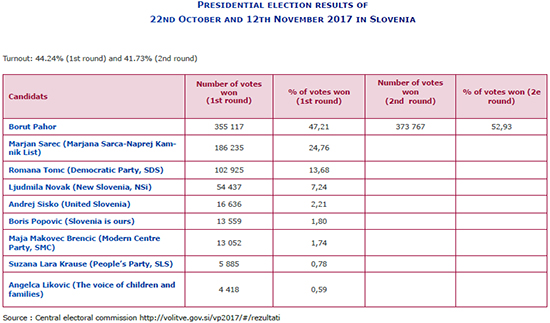Results
Elections in Europe
Corinne Deloy
-

Available versions :
EN

Corinne Deloy
Unsurprisingly, but with a narrower margin than previously expected, the outgoing head of the Slovenian State was re-elected for a second 5 year mandate as President of the Republic in the second round of voting on 12th November. He won 52.93% of the vote against 47.07% for his rival Marjan Sarec, the Mayor of Kamnik.
In the first round on 22nd October last the latter won 24.76% of the vote and the outgoing head of State easily drew ahead of him with 47.21% of the vote. On 12th November Sarec came out ahead in several of the constituencies in the north of the country.
Turnout was lower than that registered in the first round of voting (- 2.51 points), the lowest ever registered in a presidential election in the country's history. Only four Slovenians in ten turned out to ballot (41.73%, - 0.68 points in comparison with the second round of the previous presidential election on 2nd December 2012).
 Source : Central electoral commission http://volitve.gov.si/vp2017/#/rezultati
Source : Central electoral commission http://volitve.gov.si/vp2017/#/rezultati
"I have heard the Slovenians' request for me to intervene more often and more clearly. I am going to work to help politicians solve problems rather than deepen the country's divisions. I shall also work to restore confidence in democracy and the institutions, and I shall notably focus on those who did not turn out to vote," declared Borut Pahor on the announcement of the results.
Borut Pahor, who would like to represent modernity and feels that he is close to his fellow countrymen, is often qualified however as a "populist" by his rivals. He has more than 40,000 followers on Instagram on which he posts photographs of his public activities, but also private photos. The former head of State (1991-2002) Milan Kucan accused him of having turned the presidential office into something banal.
Borut Pahor, who did not hesitate to walk 700km and visit some 280 towns during his electoral campaign promised to devote himself during his second mandate "to relations between Slovenians, cooperation, political stability and security."
Aged 54, Borut Pahor comes from Postojna, a town situated in the country's south west. A graduate in Sociology, Political Science and Journalism from the University of Ljubljana, he joined the United List of Social Democrats (ZLSD) in 1993, after having been a member of the Communist League of Slovenia. He became the president of the party in 1997 and retained the post in 2001 and in 2005, when he changed the name to the Social Democratic Party (SD).
Elected an MP in 1990, Borut Pahor was re-elected in 1992, then in 1992 and 2000. In 2004 he became an MEP. After the victory of the Social Democratic Party in the general elections of 21st September 2008, he was appointed Prime Minister. The government coalition that he formed with Zares (Z), the Liberal Democratic Party (LDS) and the Democratic Party of Pensioners (DeSUS) gradually disintegrated as reforms were made and after the failure of four referendums organised in 2011 (on the introduction of a new work contract for the unemployed, students and pensioners, on the extension of working hours, on the modification of the financing of retirement pensions, the tightening of measures against illegal work and on the modification of the law governing the opening of the archives of the secret services). Borut Pahor was ejected from power on 21st September 2011 when the Slovenian parliament rejected the motion of confidence presented by his government.
Five years ago he made a triumphant come back on the political scene as he won the presidential election on 11th November and 2nd December 2012. On 12th November Borut Pahor, who will be sworn in on 23rd December next, has therefore succeeded in retaining his mandate.
Of this presidential election we shall remember the extremely weak result of Maja Makovec Brencic, the candidate of Prime Minister, Miro Cerar's party (SMC). A score that augurs badly just a few months before the next general elections planned in Slovenia in the spring.
On the same theme
To go further
Elections in Europe
Corinne Deloy
—
14 October 2025
Elections in Europe
Corinne Deloy
—
7 October 2025
Elections in Europe
Corinne Deloy
—
7 October 2025
Elections in Europe
Corinne Deloy
—
9 September 2025

The Letter
Schuman
European news of the week
Unique in its genre, with its 200,000 subscribers and its editions in 6 languages (French, English, German, Spanish, Polish and Ukrainian), it has brought to you, for 15 years, a summary of European news, more needed now than ever
Versions :



